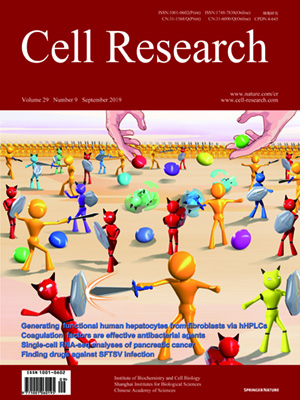
Volume 29, No 9, Sep 2019
ISSN: 1001-0602
EISSN: 1748-7838 2018
impact factor 17.848*
(Clarivate Analytics, 2019)
Volume 29 Issue 9, September 2019: 773-775
LETTERS TO THE EDITOR
Altered chromatin recruitment by FOXA1 mutations promotes androgen independence and prostate cancer progression
Bohan Xu1, Bing Song1, Xiaodong Lu1, Jung Kim1, Ming Hu2, Jonathan C. Zhao 1,3 and Jindan Yu 1,3,4
1 Department of Medicine, Division of Hematology/Oncology,Northwestern University Feinberg School of Medicine, Chicago, IL 60611, USA; 2Department of Quantitative Health Sciences, Lerner Research Institute, Cleveland Clinic, Cleveland, OH 44195, USA;3Robert H. Lurie Comprehensive Cancer Center, Northwestern University Feinberg School of Medicine, Chicago, IL 60611, USA and 4Department of Biochemistry and Molecular Genetics, Northwestern University Feinberg School of Medicine, Chicago, IL 60611, USA
These authors contributed equally: Bohan Xu, Bing Song and Xiaodong Lu
Correspondence: Jonathan C. Zhao (jonathan-zhao@northwestern.edu) or Jindan Yu (jindan-yu@northwestern.edu)
Dear Editor,
FOXA1, a forkhead (FKHD) family transcription factor, is highly expressed in the epithelium of endoderm-derived organs, including the prostate gland.1 Transgenic mouse studies have shown that FOXA1 expression is required for prostate epithelial cell differentiation and ductal morphogenesis during development and for the maintenance of this differentiated epithelial phenotype in the adult. Mechanistically, FOXA1 binds FKHD motifs in the DNA to open chromatin and increase local accessibility, thereby recruiting androgen receptor (AR) to prostate lineage-specific enhancers.2,3 AR mediates prostatic transcriptional program and normal prostate development and function. However, AR also plays a pivotal role in prostate cancer (PCa). Equilibrium between nuclear FOXA1 and AR levels is essential for defining a prostatic, rather than an oncogenic, AR program and for balancing cell differentiation and growth.4,5 In addition, FOXA1 has been shown to play androgen-independent roles in regulating epithelial-to-mesenchymal transition (EMT), cell invasion, and tumor metastasis.6 Recent studies have found FOXA1 among the most frequently mutated genes in PCa, with ~4% and ~12% mutation rates in localized tumors and metastatic castration-resistant prostate cancer (CRPC), respectively.7,8 A majority of these mutations cluster at the FKHD domain, especially around the Wing2 region.
https://doi.org/10.1038/s41422-019-0204-1
FULL TEXT | PDF
Browse 1274


